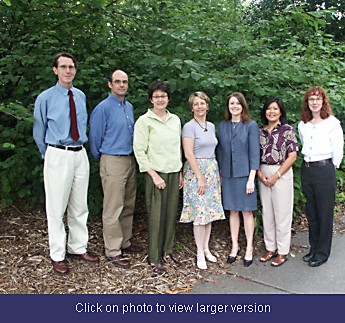Innovations
FM 101 – Internal Audit
The Mysteries of IA – Revealed at Last!
by Maureen Rhea, Sharon Scully and Chris Malins
The Internal Audit (IA) department is a bit of a mystery to most of us in FM.
There are a few reasons for this. First, Internal Audit only recently joined FM and as such hasn’t been as visible to most of us. Second, they are a small department with only 10 staffers working out of the Alumni Building on the NW corner of campus. Third and most importantly, the nature of IA’s work requires that they demonstrate organizational independence and objectivity in their approach to their audit work. They are independent of the activity they audit, although they are still part of the University.
IA’s independence is reflected by the department’s dual reporting/budgeting relationship. The department functions under the authority of the Regents Finance and Audit Committee and reports to the Treasurer of the Board, V’Ella. The actual dollars to fund Internal Audit come from the office of the Executive Vice President, Weldon Ihrig. This design is intended to prevent conflicts of interest, especially were Internal Audit ever to audit a department in FM.
The mission of Internal Audit is to provide the Regents and the University community with useful information that identifies problems, makes recommendations, and helps facilitate resolutions. This translates into three primary IA activities–audits, advisory services, and training. Let’s take a look at each of these activities separately to get a clearer picture of how this important university department operates.
Audits
On the audit side, IA focuses on financial and compliance audits. The financial work can range from auditing the financial statements of self-sustaining units to reconstructing a trail of fraudulent transactions. Compliance audits focus on how well we follow and abide by laws, regulations and University policies and procedures.
Everyone wants to know how IA determines which departments will be audited. There are actually three reasons that IA will work with a department on their financial and compliance internal controls. Either through the regularly scheduled audit process (yes, everyone gets their turn eventually), through special investigations, or by a special management request.
Departments visited as part of regularly scheduled audits are chosen based on an annual risk assessment and audit plan. Each year IA gathers and analyzes a wide variety of information in order to identify and qualify key business risks. Once the risks are ranked, IA determines the best way to allocate its resources. Sometimes scheduled audits focus on a department or other type of unit; sometimes a cross-institutional issue will be examined (e.g., gift and endowment expenditures).
Although the common stereotype is dread preceding an auditor’s arrival, IA isn’t viewed that way. Upon occasion, management actually invites IA to audit departments and systems. IA thinks of itself and is viewed campus-wide as a resource that departments can tap into if they need advice or assistance on accounting or compliance issues and questions. Ten percent of IA’s workload are special management requests.
Special investigations are the other primary activity that IA spends time on and represent fifteen percent of total workload. The 20-30 special investigations a year are usually related to fraud, employee or citizen complaints, State Auditor’s Office whistleblowers, and conflicts of interest involving faculty and staff.
When the audit work is complete, IA communicates recommendations for corrective actions in audit reports. Six months after reports are issued IA follows up on their recommendations to determine whether they have been implemented.
Training and Consulting
Training and advisory services are a growing part of IA’s activities. IA offers 30-40 training sessions each year with topics ranging from cost sharing to fraud prevention. Advisory services include: fielding a wide range of questions from academic departments and central administration, participating on teams that are discussing and addressing institutional issues or developing guidance for UW, and working with departments and units to solve problems related to internal controls, federal compliance, and ethics law.
Internal Audit is led by Maureen Rhea, and staffed by eight auditors and one support person. They have grown from just four employees in 1958 to the current staffing level of ten. While still a small department, IA has a very broad reach. They have been instrumental in improving controls and resolving complaints all over our campus. And there’s no mystery to that.
|



